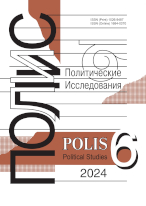Social Networks:
Problems of Internet Socialization
Tikhonova S.V.,
Dr. Sci. (Philos.), Professor, Social Communication Department, National Research Saratov State University, segedasv@yandex.ru
elibrary_id: 451683 | ORCID: 0000-0003-2487-3925 | RESEARCHER_ID: S-2386-2016
DOI: 10.17976/jpps/2016.03.11
Tikhonova S.V. Social Networks: Problems of Internet Socialization. – Polis. Political Studies. 2016. No. 3. https://doi.org/10.17976/jpps/2016.03.11
The article deals with the evolution of the Internet social reality. The author believes, that the typical properties of social interactions are laid by their developers not only explicitly on the level of interaction algorithms, but also implicitly on the level of value implications and social action orientations. From the beginning the Internet world has been constructed on the platform of symbiosis of scientific ethos, information liberalism, and virtual democracy values, cultivated by Californian ideology. It resulted in the development of alternative anonymous cyberspace or grey zone, in which private and public spheres are not differentiated, and the anonymity of users serves as protection of freedom of speech and self-expression. The spread of social networks leads to the change of anonymity paradigm to personalization paradigm. Social networks imply creation of personal profiles, containing real personal data and different kinds of personalized information. Besides, the higher veracity of personal information is, the higher the chances for the rise of interactions. Because of social networks, the Internet actively becomes socialized, absorbing the models of interaction, it has once been alternative to. The socialization of the Internet is counter to virtualization of society. If in the course of virtualization interactions with real social institutions are substituted by anonymous operation of virtual images, then in the course of socialization virtual images get real “live” personalized social connections. The spread of social networks leads to democratization of the Internet and as a result to making models of “live” communication and Internet interaction closer. This process is connected with the institutionalization of the Internet public sphere, caused by building of electronic state. In the end social reality of the Internet integrates into traditional social world, opening another level of social evolution.
See also:
Ilyin A.N.,
Internet as an alternative to politically engaged mass media. – Polis. Political Studies. 2012. No4
Chugunov A.V.,
Prospects for the Development in Russia of “Information Society” (Social Portrait of the Russian Internet Audience, as Emerging from the Data of Sociological Tests). – Polis. Political Studies. 2002. No5
Köchler H.,
The new social media: chance or challenge for dialogue?. – Polis. Political Studies. 2013. No4
Peskov D.N.,
Internet in Russian Politics: Utopia and Reality. – Polis. Political Studies. 2002. No1
Morozova E.V., Miroshnichenko I.V.,
Net communities on emergency occasions: new possibilities for the citizens and for authorities. – Polis. Political Studies. 2011. No1





.jpg)






 print
print
.jpg)
.jpg)